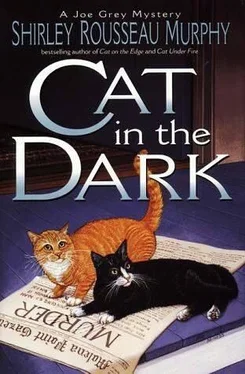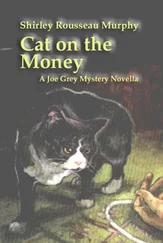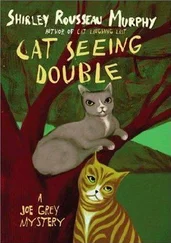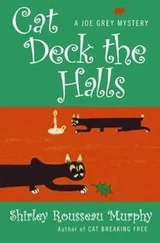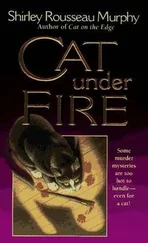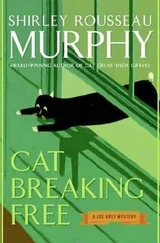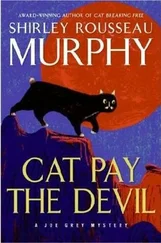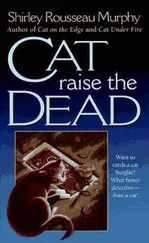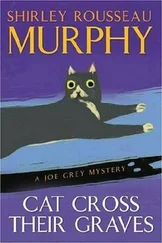She returned to the desk to hear the dispatcher shouting, "Hello? Hello?"
Standing over Jergen's body, holding the phone in the dustrag, she began to shiver. The metallic smell of blood and the smell of other bodily releases sickened her. She gave the address and stood staring down at Jergen's bloody face and bloody, torn throat, unable to hang up or to look away.
The only dead people she had encountered in her twenty-eight years were those from whom all signs of violence or distress had been gently wiped away, bodies thoughtfully groomed and arranged in the clean satin lining of expensive caskets-an elderly neighbor when she was twelve, her mother's cousin Marie two years later. Her father, when she was eighteen, and her mother when she was in art school. All the deceased were dressed in their Sunday best, their hands calmly folded over their demure chests, her mother's gold wedding band gleaming on her pale finger.
In the room's silence, the faint hum of the computer was like a thin voice whispering to her. Moving past the end of the desk and the two low file cabinets, she saw, for the first time, what appeared to be the murder weapon; though for a long moment she looked at it uncomprehending.
On the rug beside the file cabinets lay the metal divider from an ice cube tray. Blood covered its protruding aluminum handle and had run down into the little squares turning them as red as if someone had ejected a double line of red ice cubes-blood ice cubes. There should be a little wooden stick in each like the frozen orange-juice suckers that mothers made to keep their kids from eating junk.
Sirens screamed, coming up the hill. She backed away from the bloody kitchen utensil and moved unsteadily to the wide window beyond the couch. Standing at the glass, she watched the emergency vehicle careen into the lane, followed by two squad cars, watched two medics jump out loaded with an oxygen tank and black bags-as if her report of death had been faulty, as if the caller might have misjudged the condition of the victim. As if Winthrop Jergen still had a chance at life. Behind the medics, Max Harper swung out of his police unit, and two more uniformed officers from the other squad car double-timed through the patio as she hurried to unlock the door.

HIGH UP THE HILLS, a narrow hunting trail led beneath a tangle of toyon bushes, a track no wider than a cat's shoulders, and along the path in a spill of sunshine, Joe and Dulcie crouched feasting on a fat mouse, the last of five sweet morsels they had caught within the hour skittering among the roots and leaves. Above the cats, the toyon's hollylike berries were hard and green, having just emerged from their summer blossoms; the afternoon was warm and still, the only sound was the twittering of some sparrows pottering among the upper leaves.
Suddenly sirens screamed, blasting up from the village.
Rearing tall so they could see down the hills, the cats watched an ambulance careen up the winding streets followed by two police units, and skid into the dead-end street below Clyde's apartments-and they took off down the hills, Joe with visions of Clyde falling off the roof, Dulcie's sudden fear involving the power saws. Bolting down the slopes, charging through bushes and tall grass and across the last street, they scorched past the hot rubber stink of the ambulance and squad cars and into the patio.
Men's voices from above them, from Winthrop Jergen's open windows. The police radio. Max Harper's quick commands-and the faint but unmistakable smell of human blood. Racing under the stairs and up the inner wall, they slipped beneath Jergen's sink and pushed the cabinet door open.
The smell of blood, of death.
Slinking across the linoleum, they crouched at the edge of the living room. The instant the uniforms' backs were turned, they bolted under the cherry credenza, peering out at Winthrop Jergen's sprawled body. The smell of his shaving lotion mixed strangely with the stench of death.
The lamps were all lit, every light burning except the lamp that hung over the edge of the desk. The toppled swivel chair and scattered papers and files were all soaked with Jergen's blood. As the medics rose and moved away, the cats got a good look at Jergen, his throat ripped as brutally as if a leopard or tiger had been at him-but this was not a hunting kill, this was the result of human malice.
As the photographer got to work, the flashing strobe lights nearly blinded the cats, forcing them to squeeze their eyes shut. The after-flashes, the blazing white reverse-images of Jergen's body, were as eerie as if his light-propelled spirit kept flashing back, trying to rejoin his corpse.
Beyond the windows, clouds had begun to gather, dimming the late afternoon. The tangle of officers' feet moving carefully across the Kirman rug, skirting around the body, Charlie sitting quietly on the couch out of the way, and the familiar forensics routines filled the cats' vision and minds as the photographer shot his last roll and Officer Kathleen Ray began to collect evidence, her dark hair swinging around her shoulders. The first item she bagged, lifting it carefully from the floor beyond the file cabinets, held the cats' complete attention.
A device from the freezer, the thing that held the ice cubes, but covered with blood, dripping blood, its handle sticking up like a bloody knife, making them see too vividly a human hand jabbing and jabbing that blunt instrument into Jergen's soft flesh.
The cats' own bloodthirst was normal; it was the way God had made them. They were hunters, they killed for food and to train their young-well maybe sometimes for sport. But this violent act by some unknown human had nothing to do with hunting-for a human to brutally maim one of their own kind out of rage or sadism or greed was, to Joe and Dulcie, a shocking degradation of the human condition. To imagine that vicious abandon in a human deeply distressed Dulcie; she did not like thinking about humans in that way.
Pushing closer to Joe, she watched Officer Ray's familiar procedures, the tweezers, the tedious routine of picking up each fleck of evidence, the bagging and labeling, and slowly the thoroughness of her actions began to ease Dulcie. She imagined the intricacies of the laboratory studies that would follow, the carefully established methods, and a sense of rightness filled her.
Then the fingerprinting began, the black powder, the lifting tape, the fingerprint cards, all carefully thought out and calming, techniques that were the result of a wonderful human intelligence.
Humans might be sense-challenged, without a cat's balance and keen hearing and superior sense of touch, to say nothing of the cat's night vision, but the human's inventiveness and mental skills made up for those failures-people might be capable of brutality, in a shocking short circuit of the human spirit, but the best of mankind were still wonderful to observe.
And, she thought, what are we - what are Joe and I, that we can understand the achievements of humankind?
By the time the forensics team had finished, night had closed around the apartment, the black windows reflecting the blaze of lights within, turning the room stark and grim. The coroner arrived, completed his examination and bagged the body, and slid it onto a stretcher. As the paramedics carried it out, Officer Ray collected the last bits of evidence from where the corpse had lain. No one had touched the computer, except to lift fingerprints from the keyboard and monitor. The screen still glowed pale green, etching into the delicate glass the image of a financial spreadsheet.
Max Harper had sent Officer Wendell over to Mavity's cottage to take her down to the station, and patrol units were looking for Pearl Ann. Harper sat with Charlie on the couch, questioning her. "Did you see Mavity and Pearl Ann come up here to clean?"
Читать дальше
